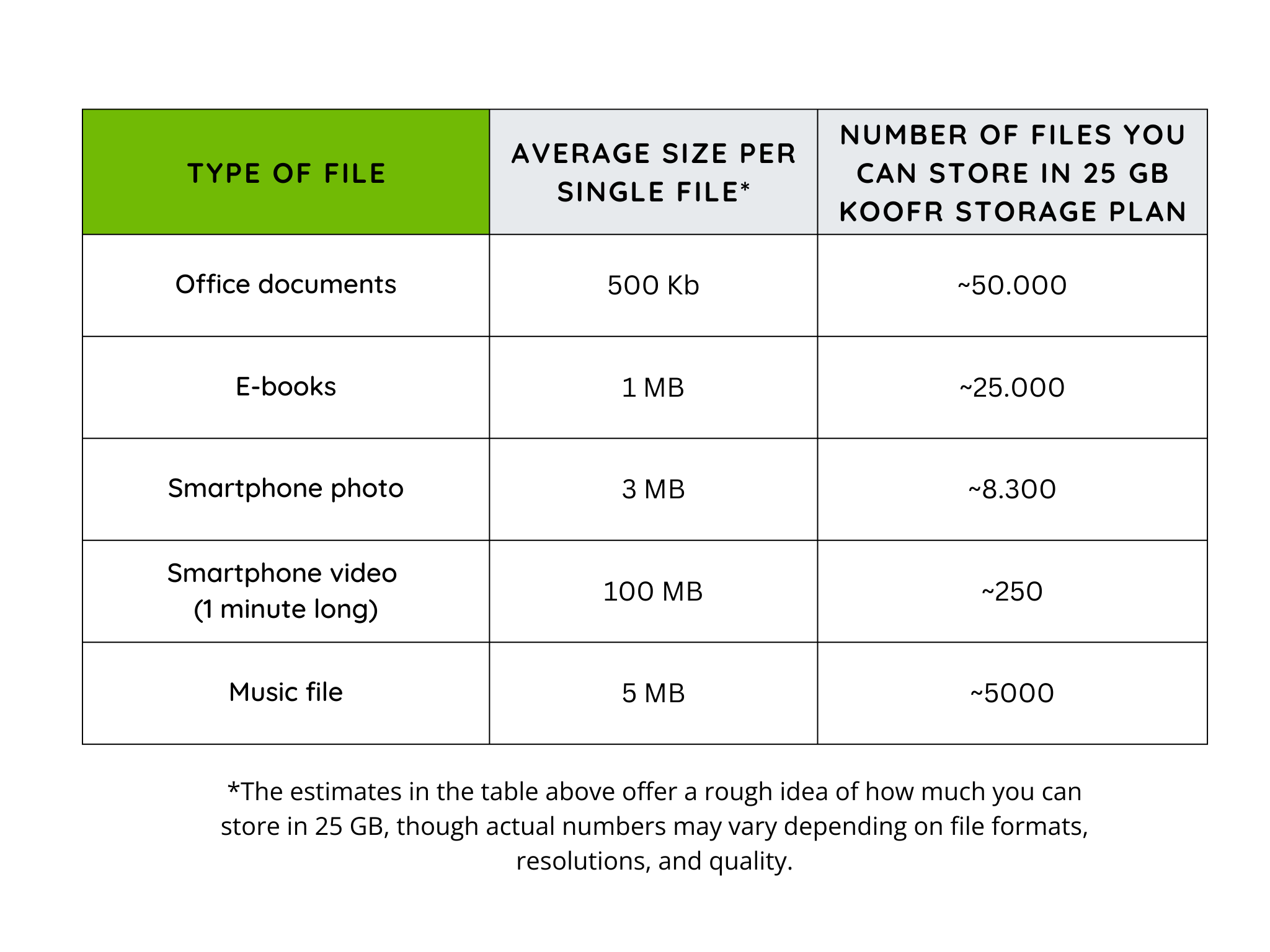How much cloud storage space do you really need?
When choosing an online service to back up your files, one of the biggest decisions you'll face is determining just how much storage space you need. With the range of digital files we manage today, storage needs can vary widely from one person to the next. And it’s easy to feel overwhelmed by the options. Turn to our guide for answers.
Written by human for humans
You're about to capture a perfect moment on your phone, only to be hit with the dreaded Storage Full message. Or maybe your computer's performance has taken a hit, bogged down by the sheer volume of files you've accumulated over the years. Sound familiar?
In a world where digital content is constantly growing - from family photos to work files - limited storage space has become a common frustration. Many people are turning to cloud storage as a solution and an easy way to free up device space while keeping files accessible and safe.
But here’s a big question many face when exploring cloud options: How much storage space do I need? The answer depends on your habits, storage needs, and how you plan to use it. Let's dive into what to consider so you can pick the right amount of space for your digital life.
TL;DR Watch a video How much storage space do you really need?
Assesing Your Cloud Storage Needs
Start by looking at the files and folders you plan to store in the cloud.
- Check the size of various folders and files on your computer, your mobile devices and any other drives you use for file storage.
- Add up the total size to get a rough idea of your current storage needs.
- It’s wise to multiply this number by at least two - this extra space allows for future files and ensures you won’t run out of room too quickly. This final number will give you a solid estimate of the cloud storage capacity you should consider purchasing.
To determine how much storage you need, you'll also need to consider the types of files you plan to store. Think about everything currently saved on your mobile devices, USB drives, external hard drives, and other storage sources. Here are some common file types and their typical storage requirements:
- Documents: Word documents, PDFs, and spreadsheets generally have small file sizes. However, with lots of documents, this can add up over time.
- Images: Photos and graphics can vary widely in size. Higher-resolution images from professional cameras take up much more space than standard smartphone pictures.

- Videos: Movies, TV shows, and other video files are the largest, especially when in high-definition or 4K quality, making videos the primary space-consuming files.
- Music: Audio files vary, but high-quality formats, like lossless audio, can be substantial in size, especially if you have an extensive music library.
Typical File Sizes and Factors That Impact Them
When it comes to file sizes, they can vary quite a bit depending on the type of file and its quality. For example, documents are typically lightweight, ranging from 100 KB to a few MB, depending on how many graphics or pages they include. Photos vary too, with standard images being around 3-5 MB each, but high-resolution shots from a professional camera can go well over 20 MB. Videos tend to be the biggest storage users; an hour of HD video is about 1-3 GB, while a 4K video could easily take up 7 GB or more per hour. Music files, on the other hand, are a bit more manageable, with standard MP3 songs at 3-5 MB each, although higher-quality formats like FLAC can reach 50-100 MB per album. These differences are key to consider when deciding how much cloud storage you'll need.
Rough estimations of typical file sizes for the most common files everybody uses and how many files you could store if you had 25 GB of cloud space (the size of Koofr's Briefcase M plan).

When considering storage needs, remember that resolution, file compression, and quality settings significantly affect file sizes. Estimating storage for these file types will give you a clear picture of the cloud storage space required to keep your digital files safe and accessible.
The size of your cloud storage account depends on the way you plan to use it
When deciding on how much space you need in your cloud storage account, think about how often you'll be accessing and updating your files. Will you be using it as backup to store files securely? Or do you plan to access and update your files regularly? Defining the frequency of interaction with your files can guide you toward a storage solution that suits your budget and access needs.
-
Backup Purposes: If you're using cloud storage mostly for backup purposes - like archiving old photos, documents, or large media collections - you may not need as much space as those accessing files frequently. In this case, choosing a more economical storage plan with sufficient capacity for a one-time upload may be ideal.
- Everyday Use: If you’ll be accessing, editing, and adding files frequently, you'll want enough space to handle ongoing updates. This is particularly relevant for shared files, work projects, or collaborative media where changes happen regularly. In this case, a plan with larger storage and reliable, easy access will serve you best.

The amount of cloud storage you need also depends on whether you're using it for personal or business purposes, as each has different requirements.
For individual users, cloud storage typically includes personal files like photos, music, documents, and videos. Personal needs vary widely; for some, a small plan may be enough, while others with large media collections may need additional space. The key is to think about the volume and type of content you want to keep safe and accessible.
Business users often require more substantial storage for large, collaborative files like design projects, video content, or high volumes of documents. Businesses also typically have multiple users accessing and updating files regularly, which means a larger plan with sharing and management tools is essential. Additional storage for regular backups and extra security features (like Koofr Vault) is also recommended to ensure smooth, safe operations.
Koofr cloud storage: a solution for all your storage needs
Koofr offers a range of storage plans designed to grow with your needs, so you can start small and easily add more storage as you require it. From a free plan with 10 GB of free storage to plans with up to 20 TB of storage that can cover the needs of even the most demanding users, we have it all. Whether you’re a casual user, a professional, or a business, Koofr has a tailored solution that scales with your needs.
Explore Koofr's paid plans and check the detailed descriptions of what they can offer you.
Koofr’s paid plans deliver far more than extra storage. They unlock a suite of powerful features that make managing, sharing, and protecting your digital files easier and more secure:
- Enhanced Security with More Koofr Vault Safe Boxes: Keep sensitive files extra secure with multiple safe boxes, ensuring peace of mind for important documents or personal media.
- Extended File Retention: Paid plans offer longer retention for your deleted files, so you have more time to recover accidentally deleted items, adding an extra layer of safety.
- Unlimited Private Sharing: Share your files privately with as many Koofr users as you like (free accounts are limited to 10 users), making it easier to collaborate with friends, family, or colleagues.
- More External Cloud Connections: Connect more external cloud accounts, such as Google Drive, OneDrive or Dropbox, to centralize your storage and access everything from one place.
- Unlimited Public Sharing Options: Share files publicly with permanent or time-limited links, perfect for sharing work files with your clients or co-workers.
- Public Receive Links: Allow anyone, even non-Koofr users, to upload files directly to your storage through public receive links, making it easy to collect files from others.
- Higher Daily Public Sharing Transfer Limit: Handle larger volumes of data sharing each day, ideal for professionals or anyone sharing extensive content with clients or collaborators.
- Work on your MS Office documents in Koofr: Edit Word, Excel, and PowerPoint files directly within Koofr without needing to download, providing seamless document handling.
- Exclusive Koofr EXP Tools: Access innovative EXP features for advanced file management, giving paid users access to Koofr’s latest tools.
- Enhanced Features of Sharing Options: Paid users enjoy in additional features when sharing files, like setting a customized password, adding messages to links and customizing the link URL, branding options and sharing without a time limit - capabilities not available to free accounts.
- Image Editor: Edit photos directly in Koofr, eliminating the need for separate photo editing software.
- Local Folders Feature: Seamlessly access files and folders on your remote computers with Local Folders.
- Duplicate File Finder: The incredibly useful duplicate file finder helps you quickly locate and remove duplicate files, keeping your storage space optimized and clutter-free.
With Koofr’s paid plans, you get a complete toolkit designed to simplify your digital life, whether for personal convenience, collaborative projects, or secure file management. Koofr is a powerful, flexible solution that goes far beyond just cloud storage, allowing you to fully manage, share, and secure your digital world.
Simplify your digital life with Koofr.
Having sufficient cloud storage gives you the freedom to store, access, and share your files without worrying about running out of space or losing valuable data. Koofr provides a scalable and secure solution tailored to a variety of storage needs, for everyone, from casual users to professionals, with flexible plans that can grow as your requirements do. With Koofr, you can keep your digital life organized, accessible, and secure.
Editor's Note: This post was first published in 2017. We've updated and enhanced the content to improve clarity and detail. Whether you're revisiting or reading it for the first time, we hope this improved version offers an even better experience.
Join us on the Koofr subbredit. We'd love to hear from you!


